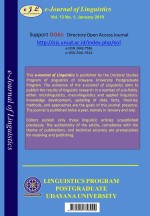Speaking for Academic Purposes Course: An Analysis of Language Functions
Abstract
Speaking as the most demanding skill to be mastered in the ESL/EFL teaching context. This is caused by the prime priority of students who want to study English in order to be able to use English for communicative purposes. Knowledge of language functions has a vital role in supporting a speaker to be more involved in the real interaction. The aim of this study is to analyze the use of language functions in the speaking for academic purposes course. This study conducted at the English department students which altogether 33 persons in STKIP Santu Paulus Ruteng, Indonesia. Then data were collected through observation, field note and natural recorded when the respondents were doing the English speaking exercises at the speaking for academic purposes course. Data collection were done during eight meetings and only language functions utterances of those respondents were analyzed. The utterances recorded are expected to be representative of the whole the language functions. Utterances produced by respondents were recorded precisely by the researchers. The result showed that there are five types of language functions found, namely interactive function, informative function, manipulative function, motivative function and directive functions. Those functions are reciprocal. Speaking practitioners are suggested to provide the knowledge of language functions in the speaking learning process.
Downloads
References
Ambrosio, Y. M., Binalet, C., Ferrer, R., and Yang, J. 2015. Analysis of Language Functions in Children’s Classroom Discourse. International Journal of Education and Research, 3 (2), 105-114.
Azizifard, F. and Jalali, S. 2012. Context and Humor in Teaching Language Functions. Theory and Practice in Language Studies, 2 (6), 1191-1198. https://doi.org/10.4304/tpls.2.6.1191-1198
Brown, H. D. 2004. Language Assessment: Principles and Classroom Practices. New York: Addison Wesly Longman Inc.
Brown, H. D. 2007. Principles of Language Learning and Teaching. Fifth Edition. San Fransisco: Pearson Education, Inc.
Celce-Murcia, M. 2001. Teaching English as a Second or Foreign Language. Third Edition. New York: Heinle&Heinle Ltd.
Dickinson, P. 2013. “B/w U & me”: The Functions of Formulaic Language in Interactional Discourse on Twit er. The Linguistics Journal, 7(1), 7-38.
Halliday, M. A. K. 1973. Explorations in the functions of language. London: Edward Arnold.
Harmer, J. 2007. How to the Practice of English Language Teaching. Fourth Edition. Edinburgh Gate: Pearson Longman.
Imaniah, I. and Dewi, N. F. K. 2017. The student’s academic speaking skill achievement in terms of communication, personality and gender. The Asian EFL Journal, TESOL Indonesia International Conference Edition, 8, 28-35.
Jakobson, R. 1987. Linguistics in Literature. London: Harvard University Press.
Lee, J. S., Choi, J. Y., and Marqués-Pascual, L. 2016. An Analysis of Communicative Language Functions in the Speech Patterns of Bilingual Korean and Mexican Immigrant Children. New Approaches in Educational Research, 5(2), 66-73. http://doi.org/ 10.7821/naer.2016.7.193
Leech, G. 1974. Semantics. England: Penguin Books.
Leong, Lai-Mei. and Ahmadi, S. M. 2017. An analysis of factors influencing learners’ English speaking skill. International Journal of Research in English Education, 2(1), 34–41. https://doi.org/10.18869/acadpub.ijree.2.1.34
Lestari, D. 2017. “Penggunaan Fungsi-Fungsi Bahasa di Bidang Tata Hidangan dalam Pembelajaran Keterampilan Berbicara Bahasa Inggris” (disertasi). Denpasar: Universitas Udayana.
Lestari, D., Suastra, I. M., Pastika, I. W., and Sedeng, I. N. 2017. Developing A Method of Learning English Speaking Skills Based on the Language Functions Used in the Food and Beverage Service. E-Journal of Linguistics, 11 (1), 70-79.
Kayi, H. 2006. Teaching Speaking: Activities to Promote Speaking in Second Language. (serial online), November., [cited 2017 October 29]. Available from: http://iteslj.org.
Kemenristekdikti. 2012. Kerangka kualifikasi nasional Indonesia. Jakarta: Kementerian, Riset, Teknologi dan Pendidikan Tinggi.
Mckay, P. 2007. Assessing Young Language Learners. Cambridge: Cambridge University Press.
Menggo, S. 2018. English Learning Motivation and Speaking Ability. Journal of Psychology and Instructions, 2( 2), 70-76.
Menggo, S., Suastra, I. M., Budiarsa, M., and Padmadewi, N. N. 2019. Needs Analysis of Academic-English Speaking Material in Promoting 21st Century Skills. International Journal of Instruction, 12(2), 739-754. https://doi.org/10.29333/iji.2019.12247a
Parpalea, M. 2011. The Functional Approach in German Linguistics: Philology and Cultural Studies. Journal Transilvania Univeristy of Braşov, 4 (2), 115-122.
Redhead, G. and Dunbar, R. I. M. 2013. The Functions of Language: An Experimental Study. Evolutionary Psychology Journal, 11(4), 845-854.
Sarwadi, S., Yadnya, I. B. P., Beratha, N. L. S., and Puspani, I. A. M. 2019. Function and Meaning of Metaphors in The Palm-Leaf Manuscript of Cilinaya Written in Sasak Language and its Translation. E-Journal of Linguistics, 13 (1), 43-55. https://doi.org/10.24843/eJL.2019.v13.i01.p05
Tarigan, H. G. 2015. Berbicara Sebagai Suatu Keterampilan Berbahasa. Edisi Revisi. Bandung: Angkasa.
Tribus, A. C. 2017. “The Communicative Functions of Language: An Exploration of Roman Jakobson’s Theory in TESOL” (Thesis). Brattleboro, VT: SIT Graduate Institute.

This work is licensed under a Creative Commons Attribution 4.0 International License.

This work is licensed under a Creative Commons Attribution 4.0 International License











